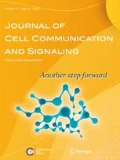The present issue of JCCS is quite a special one, in the sense that, in addition to bringing a new array of interesting communications, it is a testimony to the efforts that we have made into expanding the scope of our publication since its inception 13 years ago.
JCCS is the official journal of the International CCN Society, that was created in 2001 to foster the physical interactions between scientists and medics interested in the processes of cellular communication and signaling governing key biochemical and physiological steps, both in normal situations and in pathological conditions such as fibrosis, cancer and metabolic diseases.
Originally centered around molecular aspects of CCN proteins, communication between themselves and with their micro environment, the journal quickly became a unique niche for the publication of new research trends in communication and signaling processes that underly the various stages and levels of cell proliferation, differentiation and death in living organisms.
JCCS has become a reference in translational and fundamental cellular biology, with a marked orientation towards the deciphering of cellular networking in the associations amongst multicomplex proteins and ligands.
The scientific integrity of JCCS today stems from the credibility of its editorial board members and the critical reviewing process that is performed by our section editors.
It is my honor and great pleasure to briefly introduce two special features of the present JCCS issue. In addition to Andrew Leask’s commentary that throws light upon his dedication to JCCS, I would like to pay a special tribute to all our editors who acknowledged my invitation to produce a short summary of their scientific fields, which altogether would provide an open window on the exquisite set of expertises on which JCCS is built. I am proud of their contributions and feel priviledged working with such a collaborative and friendly group.
I am deeply thankful to this wonderful editorial team, to our section editors, and administrative assistant for their efforts and continued support.
Bernard Perbal, Editor in Chief
Author information
Authors and Affiliations
Corresponding author
Additional information
Publisher’s note
Springer Nature remains neutral with regard to jurisdictional claims in published maps and institutional affiliations.
Rights and permissions
About this article
Cite this article
Perbal, B. Foreword. J. Cell Commun. Signal. 14, 1 (2020). https://doi.org/10.1007/s12079-020-00557-4
Published:
Issue Date:
DOI: https://doi.org/10.1007/s12079-020-00557-4

